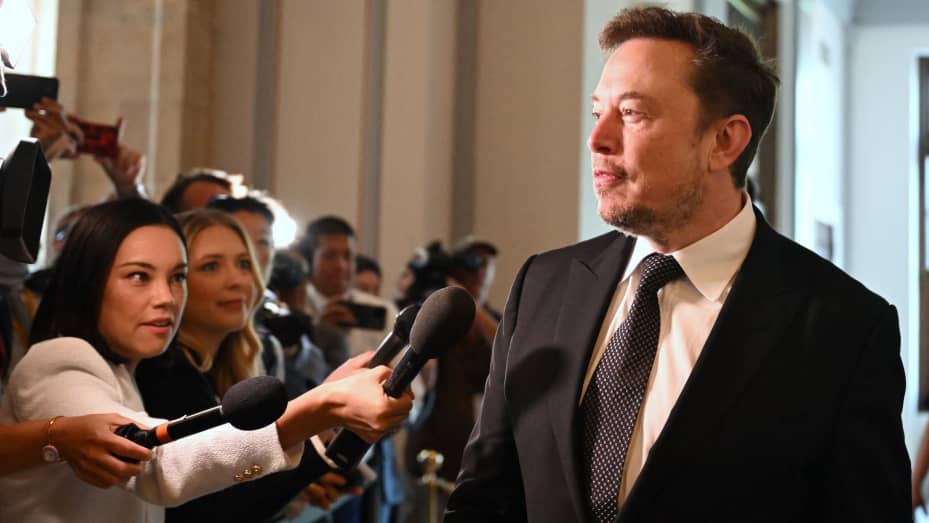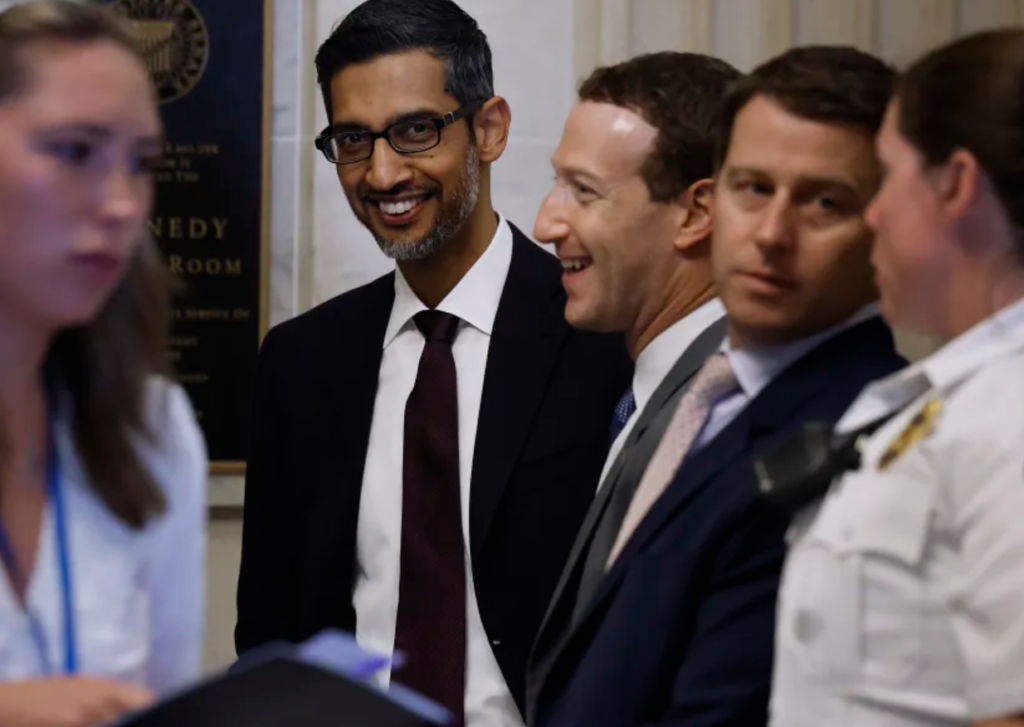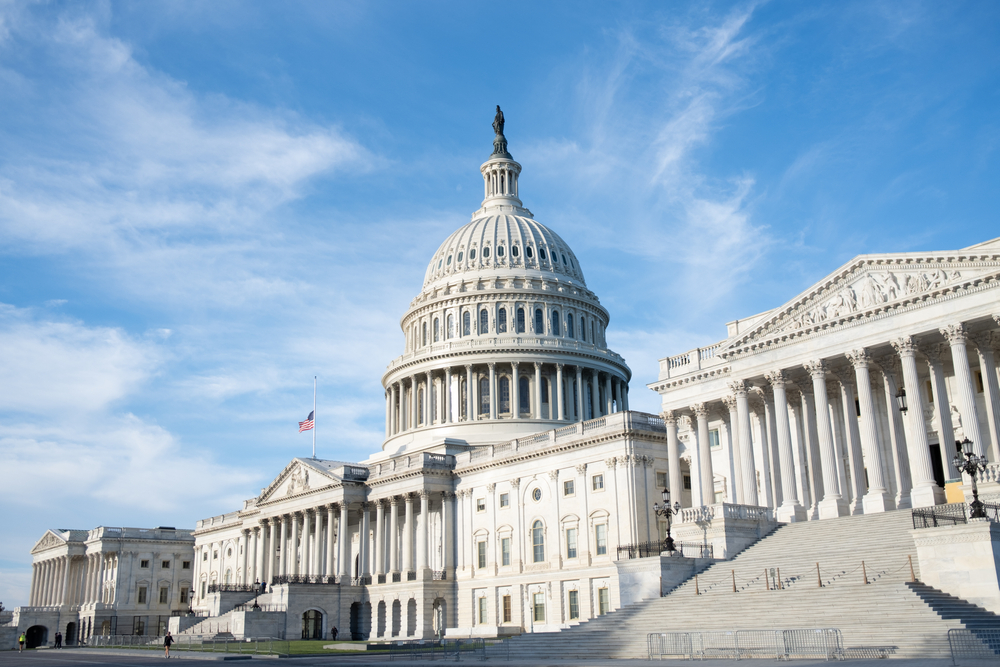Tech executives, AI researchers, civil rights advocates, and labor leaders gathered in a single room at Capital Hill to discuss the future of AI.
Hosted by Senate Majority Leader Charles “Chuck” Schumer, the AI Insight Forum aimed to be the “bedrock” for bipartisan AI policy.
“Only Congress can do the job,” Schumer stressed, urging lawmakers to abandon the “heads in the sand” approach to AI.
“Today, we begin an enormous and complex and vital undertaking: building a foundation for bipartisan AI policy that Congress can pass,” he further elaborated.
Sitting in a room that once hosted investigations into the Titanic and Watergate were Elon Musk of Tesla, Mark Zuckerberg of Meta, Sundar Pichai of Google, and Sam Altman of OpenAI, among others.
FIRST LOOK:
Our first-ever bipartisan AI Insight Forum is kicking off now! We’re convening this balanced and diverse group to talk about how Congress must join the AI revolution.
We need all hands on deck to maximize AI’s societal benefits while minimizing its many risks. pic.twitter.com/0ZYiwIzFUp
— Chuck Schumer (@SenSchumer) September 13, 2023
The gravity of the occasion wasn’t lost on anyone, not least because of its high-stakes, closed-door nature – a point of consternation for many.
Overall, the event underscored the urgent need for mutually agreed AI regulation to promote innovation while protecting from harm.
Musk said of the event, “I think this meeting could go down in history as important to the future of civilization.”

While the tone of the Forum was mostly sincere, some highlighted how Musk and Zuckerberg had been sat at opposite ends of the room, as the two had been discussing holding a ‘cage fight’ in Las Vegas.
It wouldn’t have been the first brawl in Capitol Hill.
Elon Musk and Mark Zuckerberg seated at opposite sides of the U-shaped table for the AI insight forum: pic.twitter.com/xaJLxo2Pe1
— Frank Thorp V (@frankthorp) September 13, 2023
The clock is ticking
AI is evolving at an unprecedented rate, shaping sectors from healthcare to warfare.
We’ve seen AI-discovered drugs go to clinical trial, mind-controlled limbs restore movement to the paralyzed, and brain-body interfaces replenish the speech of stroke victims.
We’ve witnessed AI-enhanced disease diagnostics, MRI scans, flood detection, and wildlife conservation.
But AI’s dark side has also reared its ugly face, with advanced automated military technology, biased algorithms resulting in false imprisonment, colossal environmental impacts, and lawsuits a-plenty.
In May, OpenAI CEO Sam Altman testified before Congress, warning that AI could “cause significant harm to the world.”
Not long after, the non-profit Center of AI Safety (CAIS) released a statement comparing the risks of AI to pandemics and nuclear war.
Tech leaders reiterated a sense of urgency at the forum. “We need government to lead, and we look forward to partnering with you,” Altman planned to say, according to the Washington Post.
President Biden himself has held multiple AI meetings this year, and congressional committees have carried out at least 10 AI-focused hearings covering issues from national security to human rights.
It’s a similar story in the EU, UK, and China, which are all making regulatory plays to lockdown AI’s negative impacts while capturing its benefits – an intricate and high-stakes balancing act.
Balancing act: profits, ethics, and regulation
As expected, collaboration at the Forum wasn’t without its complexities and contradictions.
For instance, while Altman advocated for a specialized government agency for AI regulation, Google opposed the idea, suggesting that oversight be distributed across various government bodies.

This landmark meeting wasn’t just a policy discussion – it represented unresolved debates surrounding ethics, profitability, and control.
On one hand, there is palpable excitement about AI’s potential.
On the other hand, there’s a growing apprehension about AI’s ethical implications, especially regarding discrimination and national security.
This schism was evident among the attendees themselves. For example, Alex Karp, CEO of Palantir, expressed confidence in tech companies, stating, “Yes. Because we’re good at it,” when asked if Americans should trust tech companies to keep them safe.
Meanwhile, critics outside the meeting were less optimistic. Meredith Whittaker, president of Signal, saw the event as legitimizing “bad outcomes” and stated, “They’ve gathered the leadership of the companies angling to dominate and profit from the AI hype cycle.”
Senator Josh Hawley’s remarks bolstered this sentiment: “I don’t know why we would invite all the biggest monopolists in the world to come and give Congress tips on how to help them make more money and then close it to the public.”
Other stakeholders said their piece, including Liz Shuler, the president of the A.F.L-C.I.O. Union, who stated, “Workers are tired of being guinea pigs in an A.I. live experiment.”
She continued, “The labor movement knows A.I. can empower workers and increase prosperity, but only if workers are centered in its creation and the rules that govern it.”
The road ahead
So what comes next? Likely a complex jigsaw puzzle involving stakeholders with conflicting interests.
While this is the first entry in what Schumer intends to be many, the AI Insight Forum may not have provided definitive answers, but it did mark a historical moment – a first step towards a collaborative, albeit controversial, approach to dealing with AI.
The coming months and years will reveal whether this unprecedented forum served as a genuine foundation for meaningful regulation or merely as a complex dance of competing agendas.
AI Insight Forum: 5 things we learned
- Schumer emphasized the event’s significance: “Because today, we begin an enormous and complex and vital undertaking: building a foundation for bipartisan AI policy that Congress can pass.” He intends the Forums to definitely shape US regulation, though this will likely be an iterative, mosaic-like process.
- The meeting was criticized for its closed-door nature, limiting senators from asking questions. Senator Elizabeth Warren said, “The people of Massachusetts did not send me here not to ask questions,” expressing concern over the lack of direct interaction and questioning during the forum. Senator Josh Hawley said the event was a “giant cocktail party.”
- Legislation around AI is now seen as urgent, with President Biden also holding numerous meetings on the subject. A bipartisan group of senators recently introduced a bill to ban the use of generative AI in falsifying federal candidates in political ads.
- Some tech executives, including Sam Altman of OpenAI, proposed the creation of a new government agency focused on AI regulation. However, this was met with skepticism from some lawmakers concerned about expanding government reach.
- The forum exposed divisions in both tech and political circles on how to approach AI regulation. While some call for a more cautious approach, others, like Palantir’s CEO Alex Karp, were more optimistic, stating that Americans should trust tech companies to keep them safe from the technology “Because we’re good at it.”
The global appetite for discussion and debate surrounding AI has soared in an attempt to match the technology’s rapidly evolving nature.
AI is exceptionally tricky to capture and limit through legislative processes, as it’s fast, evasive, and quickly expanding into every industry.
The inaugural AI Insight Forum has made history, but will AI write its own future, or can humanity maintain its grasp?





